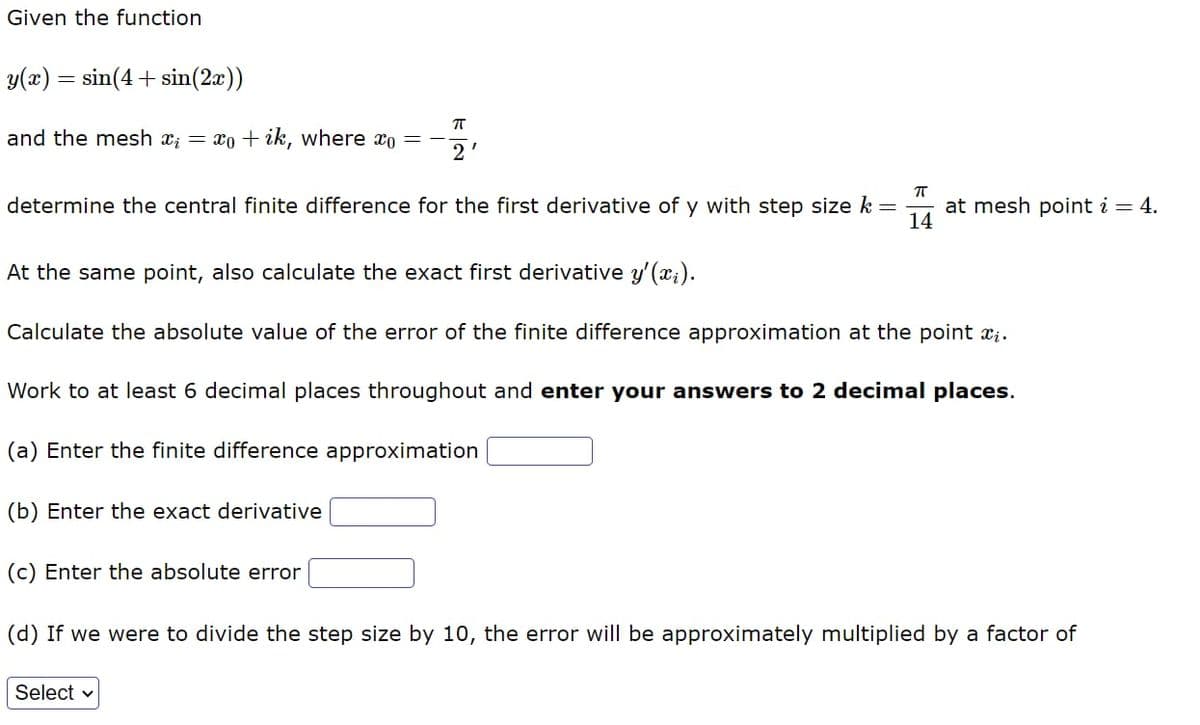Given the function y(x) = sin(4+ sin(2x)) and the mesh x₁ = xo + ik, where co ㅠ 2' ㅠ determine the central finite difference for the first derivative of y with step size k = 14 (c) Enter the absolute error at mesh point i = 4. At the same point, also calculate the exact first derivative y'(x). Calculate the absolute value of the error of the finite difference approximation at the point x₁. Work to at least 6 decimal places throughout and enter your answers to 2 decimal places. (a) Enter the finite difference approximation (b) Enter the exact derivative
Given the function y(x) = sin(4+ sin(2x)) and the mesh x₁ = xo + ik, where co ㅠ 2' ㅠ determine the central finite difference for the first derivative of y with step size k = 14 (c) Enter the absolute error at mesh point i = 4. At the same point, also calculate the exact first derivative y'(x). Calculate the absolute value of the error of the finite difference approximation at the point x₁. Work to at least 6 decimal places throughout and enter your answers to 2 decimal places. (a) Enter the finite difference approximation (b) Enter the exact derivative
Functions and Change: A Modeling Approach to College Algebra (MindTap Course List)
6th Edition
ISBN:9781337111348
Author:Bruce Crauder, Benny Evans, Alan Noell
Publisher:Bruce Crauder, Benny Evans, Alan Noell
Chapter2: Graphical And Tabular Analysis
Section2.1: Tables And Trends
Problem 1TU: If a coffee filter is dropped, its velocity after t seconds is given by v(t)=4(10.0003t) feet per...
Related questions
Question
Plz complete solution

Transcribed Image Text:Given the function
y(x): = sin(4 + sin(2x))
and the mesh x₁ = xo + ik, where co
determine the central finite difference for the first derivative of y with step size k
-
ㅠ
2
(c) Enter the absolute error
ㅠ
14
At the same point, also calculate the exact first derivative y'(xi).
Calculate the absolute value of the error of the finite difference approximation at the point ï¿.
Work to at least 6 decimal places throughout and enter your answers to 2 decimal places.
(a) Enter the finite difference approximation
(b) Enter the exact derivative
Select
at mesh point į = 4.
(d) If we were to divide the step size by 10, the error will be approximately multiplied by a factor of
Expert Solution
This question has been solved!
Explore an expertly crafted, step-by-step solution for a thorough understanding of key concepts.
Step by step
Solved in 5 steps with 7 images

Recommended textbooks for you

Functions and Change: A Modeling Approach to Coll…
Algebra
ISBN:
9781337111348
Author:
Bruce Crauder, Benny Evans, Alan Noell
Publisher:
Cengage Learning

Functions and Change: A Modeling Approach to Coll…
Algebra
ISBN:
9781337111348
Author:
Bruce Crauder, Benny Evans, Alan Noell
Publisher:
Cengage Learning